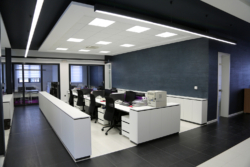Working in a busy office with potentially hundreds of employees grinding away on computers every day is a fascinating environment. If you are the owner or manager of an operation like this, then naturally your first concern is staff safety and wellbeing. However, once you have that pinned down, how do you look after the computers?
Technology, like humans, needs downtime, rests, care, and attention. Too much strain on old or outdated technology could cause issues that will require expensive IT support or breakdowns that will put a halt to productivity.
Use professional advice
As with many aspects of business, turning to the professionals is always an option. Experts such as those at Online Computers know how technology functions and can provide you with support for reliable networks and proactive monitoring, which will keep your operations running smoothly.
Trying to resolve technology issues yourself, if you are not a professional in the field, could lead to more significant and more expensive problems if you get it wrong or make an incorrect call.
Don’t turn computers on and off frequently
As explained by Geek Squad agent Steve Leslie, turning a computer on and off multiple times a day can shorten its lifespan. If a device is only being used once a day for a couple of hours, then it is recommended that you shut it down after use, but in a busy office environment, this practice could be detrimental. The powering up of a computer gives it a surge of electricity which is a light stress on the device – doing this too often, understandably, is not the best idea.
To save electricity and become a greener business, you should still think about asking employees to shut down their workstations at the end of the day, when they aren’t going to be used for another 12 hours or more.
Use traditional methods
Try, if possible, to reduce how much your office relies on computer usage. There are some traditional methods of working that might be used less in the modern day but are still just as effective. For instance, hold conferences in computer-free rooms and brainstorm using flip charts and whiteboards.
Consider having a screen-free break room, to give employees’ eyes a rest and stop computers from getting used and stressed throughout lunch breaks. Harking back to a time before computers, and turning their monitors off when not in use, could prolong the life of your devices and also save on electricity.
Update your technology
Finally, it is vitally important that you keep your technology up to date. Whether this is updating your current devices so that they are operating to the best of their ability or purchasing new hardware to replace old and inefficient ones, keeping your tech as fresh and up to the minute as possible will help ensure smooth operations.
Updates help remove bugs and repair holes in your system’s security that might have been discovered over time. Removing these outdated and occasionally dangerous aspects of your office’s technology should help relieve stress from them, making them last longer and saving you money.






